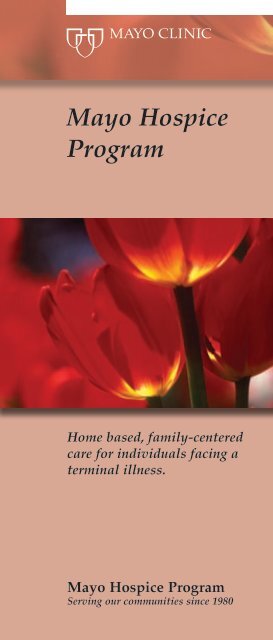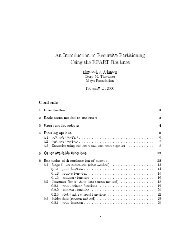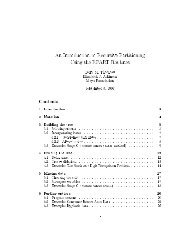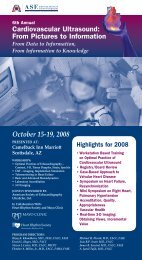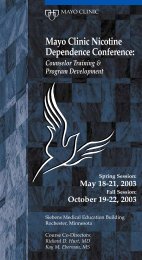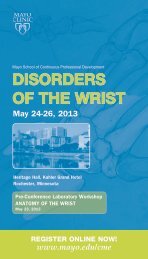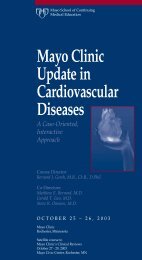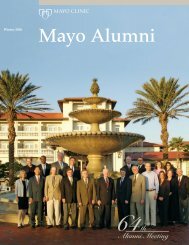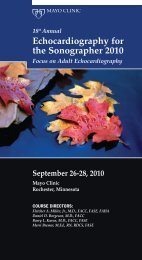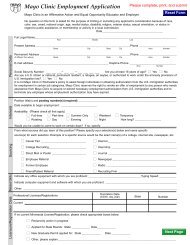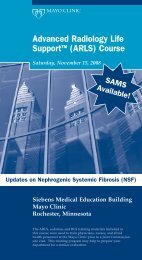Mayo Hospice Program booklet - MC0749
Mayo Hospice Program booklet - MC0749
Mayo Hospice Program booklet - MC0749
Create successful ePaper yourself
Turn your PDF publications into a flip-book with our unique Google optimized e-Paper software.
<strong>Mayo</strong> <strong>Hospice</strong><br />
<strong>Program</strong><br />
Home based, family-centered<br />
care for individuals facing a<br />
terminal illness.<br />
<strong>Mayo</strong> <strong>Hospice</strong> <strong>Program</strong><br />
Serving our communities since 1980
“What opened the door<br />
for me to invite hospice in<br />
was when somebody told me that<br />
hospice was for helping people<br />
live life to the fullest.”<br />
Father of a <strong>Mayo</strong> <strong>Hospice</strong> patient
The <strong>Mayo</strong> <strong>Hospice</strong> <strong>Program</strong><br />
Is Committed To:<br />
• Quality, home based, family-centered<br />
care for individuals facing a terminal<br />
illness.<br />
• An interdisciplinary team approach<br />
to the patient’s physical, emotional,<br />
social and spiritual needs.<br />
• State of the art pain and symptom<br />
management.<br />
• Preparation of patient and family for<br />
death at home.<br />
• Bereavement support following the<br />
death.<br />
The <strong>Mayo</strong> <strong>Hospice</strong> <strong>Program</strong> Believes:<br />
The highest quality of living is achieved<br />
when the family unit and the hospice<br />
team together offer:<br />
Hope<br />
Opportunity<br />
Support<br />
Presence<br />
Individualized care<br />
Comfort<br />
Encouragement
“Our dream and goal of living<br />
to the end at home was<br />
realized with hospice.<br />
Everyone involved added<br />
something to our care.”<br />
Spouse of a<br />
<strong>Mayo</strong> <strong>Hospice</strong> patient
Commonly Asked Questions:<br />
When is it appropriate to consider<br />
hospice care and who should initiate<br />
the discussion?<br />
At any time during a terminal illness, it<br />
is appropriate to discuss all of a<br />
patient’s care options, including<br />
hospice. Discussions that change the<br />
focus of care from curative to comfort<br />
care can be difficult. While hospice<br />
care does not provide a cure, it does<br />
provide an option for individuals and<br />
families who want to live each day to<br />
the fullest…together at home. <strong>Hospice</strong><br />
staff members are available to discuss<br />
these concerns with the patient, family<br />
and doctor.<br />
The patient and family should feel free<br />
to initiate the discussion at any time<br />
with their doctor, other healthcare<br />
professionals, clergy or friends.<br />
How difficult is caring for a dying<br />
loved one at home?<br />
The role of caregiver is challenging,<br />
yet, caring for a loved one can provide<br />
personal satisfaction, shared joy and<br />
inner peace. It is hospice’s experience<br />
that care provided by a family member<br />
or friend offers the greatest source of<br />
comfort to the patient.
The <strong>Mayo</strong> <strong>Hospice</strong> team makes it<br />
possible for patients to enjoy the<br />
comforts of home by supporting<br />
and empowering families to become<br />
the best caregivers that they can be.<br />
<strong>Hospice</strong> staff instructs caregivers<br />
in the management of the patient’s<br />
physical symptoms, provision of dayto-day<br />
care, and the administration of<br />
medications.<br />
Care may involve more than meeting<br />
the physical needs of the patient. A<br />
terminal illness can affect emotions,<br />
relationships, finances and spiritual<br />
strength. <strong>Hospice</strong> addresses these<br />
aspects of a terminal illness when<br />
appropriate.<br />
<strong>Mayo</strong> <strong>Hospice</strong> staff is concerned about<br />
the caregiver as well as the patient. We<br />
are aware that caregivers need periodic<br />
relief. Trained volunteers are available<br />
to visit the patient on an ongoing or<br />
as needed basis. Should the caregiver<br />
need a more extended period of relief,<br />
hospice can arrange short-term respite<br />
care. If the patient requires hospital<br />
care for the management of symptoms<br />
or admission to a nursing home, hospice<br />
coordinates these transitions on behalf<br />
of the patient and family. In most cases,<br />
hospice care continues uninterrupted<br />
from one setting to another.
“When first told I was to be my<br />
spouse’s main care provider, I nearly fainted.<br />
After going through it, I can now highly<br />
recommend hospice to anyone. <strong>Hospice</strong><br />
stood behind a very shaky, scared person and<br />
guided me till my confidence swelled<br />
up to the point I was no longer scared<br />
but ready for any challenge.<br />
I’m forever grateful to hospice.”<br />
Spouse of a <strong>Mayo</strong> <strong>Hospice</strong> patient
What specific assistance does hospice<br />
provide?<br />
Care is coordinated by a team<br />
comprised of doctors, nurses, social<br />
workers, clergy, pharmacists, therapists<br />
and volunteers. Team members offer<br />
instruction, guidance and support<br />
on needs ranging from day-to-day<br />
matters such as filling prescriptions to<br />
more difficult physical and emotional<br />
issues. In addition, medications,<br />
supplies, equipment, hospital services<br />
and additional helpers in the home are<br />
provided as appropriate.<br />
Bereavement support for the family is<br />
provided by team members for up to<br />
one year.<br />
Is the home the only place hospice care<br />
can be delivered?<br />
No. Although most <strong>Mayo</strong> <strong>Hospice</strong><br />
services are delivered at home, some<br />
patients live in nursing homes, assisted<br />
living facilities or adult foster care<br />
homes.<br />
Eligibility Criteria<br />
Patients of any age, with a terminal<br />
disease, are eligible to receive <strong>Mayo</strong><br />
<strong>Hospice</strong> <strong>Program</strong> services. The patient’s<br />
doctor and the hospice medical director<br />
must agree that the condition is terminal<br />
and that the goal of treatment is comfort<br />
rather than cure.
Patient and family benefit most when<br />
there is early involvement with hospice<br />
services. <strong>Mayo</strong> <strong>Hospice</strong> serves patients<br />
who reside in Dodge, Fillmore, Olmsted<br />
or Wabasha counties in Minnesota, or in<br />
Buffalo or Pepin counties in Wisconsin.<br />
Referral<br />
A doctor, nurse, social worker, family<br />
member or any concerned person may<br />
refer patients to the <strong>Mayo</strong> <strong>Hospice</strong><br />
<strong>Program</strong>. A member of the <strong>Mayo</strong><br />
<strong>Hospice</strong> team will meet with the patient<br />
and family to discuss hospice services.<br />
Financial Resources<br />
<strong>Hospice</strong> care is covered by Medicare,<br />
Medicaid, and by most private<br />
insurance companies. <strong>Mayo</strong> <strong>Hospice</strong><br />
staff will help the patient and family<br />
identify sources of payment.<br />
Memorial Gifts<br />
Gifts in memory of a family member<br />
or friend, in honor of an individual or<br />
in recognition of a special occasion,<br />
express what words alone cannot<br />
and provide important support for<br />
<strong>Mayo</strong> <strong>Hospice</strong> <strong>Program</strong>. Please make<br />
your check payable to <strong>Mayo</strong> <strong>Hospice</strong><br />
<strong>Program</strong> and note the name of the<br />
person you would like to honor.<br />
It is our policy to notify the honoree’s<br />
family that a gift is made. Please
include the family’s name and<br />
address if you would like us to do so.<br />
Donations and memorial gifts support<br />
the hospice volunteer and bereavement<br />
programs which includes bereavement<br />
outreach to community members.<br />
Gifts can be made by credit card by<br />
calling our toll-free telephone number<br />
(800) 297-1185, or by check.<br />
Department of Development<br />
<strong>Mayo</strong> Foundation<br />
200 First Street SW<br />
Rochester, MN 55905<br />
<strong>Mayo</strong> <strong>Hospice</strong> <strong>Program</strong><br />
Medicare Certified<br />
Rochester Office:<br />
200 First Street S.W.<br />
Rochester, Minnesota 55905<br />
507-284-4002 or 1-800-679-9084<br />
FAX: 507-284-0220<br />
Wabasha Office:<br />
St. Elizabeth’s Hospital<br />
1200 Grant Boulevard West<br />
Wabasha, Minnesota 55981<br />
651-565-5550 or 1-800-506-5519<br />
FAX: 651-565-5969
“ My family and I thought hospice<br />
was just wonderful and highly<br />
recommend the program.<br />
Our only regret is that we didn’t<br />
have <strong>Mayo</strong> <strong>Hospice</strong> sooner.”<br />
Spouse of a <strong>Mayo</strong> <strong>Hospice</strong> patient<br />
Mission St a t e m e n t<br />
To promote self-determined life closure, safe and<br />
comfortable dying and effective grieving.
<strong>MC0749</strong>rev0309


